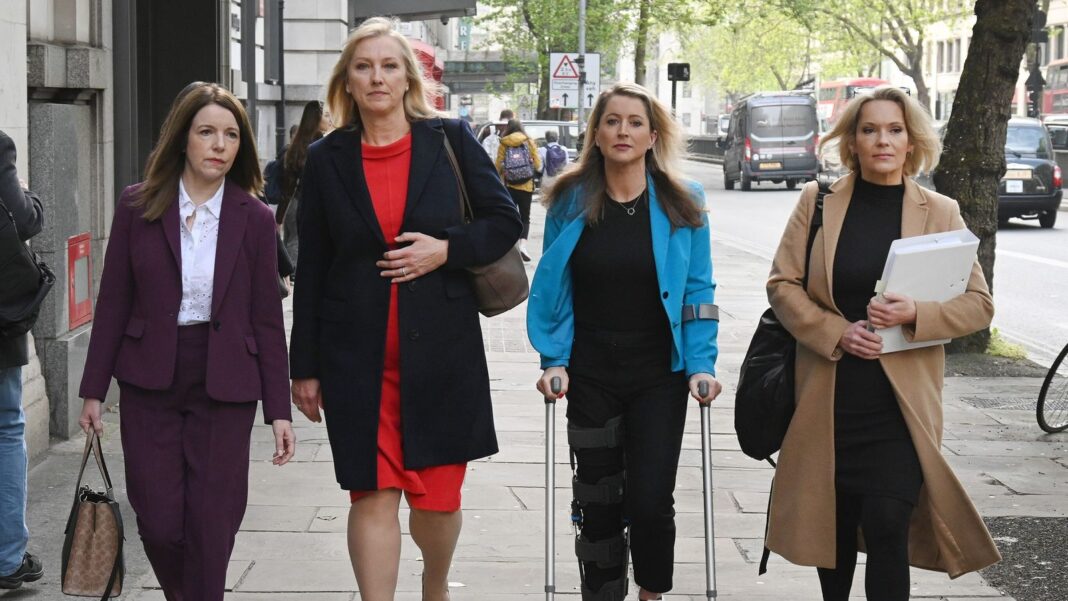
Four senior BBC newsreaders have begun legal action against the corporation on grounds of sex and age discrimination and equal pay.
Martine Croxall, Annita McVeigh, Karin Giannone, Kasia Madera are attending a two-day preliminary hearing in central London which is laying out the groundwork for a full tribunal against the corporation.
The women, who have all been presenters on BBC News channels, claim they lost roles they held at the corporation following what they have called a “sham recruitment exercise” which they believe was “rigged”.
The legal action comes after the corporation announced proposals to merge its BBC News and World News channels in July 2022.
The women applied for the new roles as BBC News chief presenters but lost out to successful applicants including Matthew Amroliwala.
In their witness statements, which appear to be similar, the women say they were aged between 48 and 54 at the time of the alleged discrimination.
They say they suffered “discrimination on the grounds of age and sex victimisation” and “victimisation for carrying out protected acts” – referring to the fact they previously brought equal pay claims.
The newsreaders say the fact they have filed equal pay claims in the past is part of the reason the BBC treated them the way it did.
“The BBC grinds you down on pay,” Ms Croxall told the hearing.
The women claim in their witness statements that they have been “demoted” since the merging of the channels, while three of them are “facing a sizeable pay cut, with a fourth having had her pay cut for half of her job”.
“No men and no women younger than us suffered these detriments,” their statements add.
In their tribunal claim, the women said that a manager had told union reps in consultation meetings that new lower paid correspondent-presenter jobs were intended as development opportunities, meaning they were for people with less experience than them.
They also said that the cuts have left the new channel understaffed and that director-general Tim Davie had said publicly on several occasions he wanted far fewer presenters.
The women believed they have not been paid equally compared with their male counterparts since February 2020 and there was a gap of about £36,000 a year in pensionable salary as of February 2023.
They described themselves as having been “set up to fail in the jobs process” which saw them being denied work while less experienced freelancers and casuals have covered shifts they could have done.
Read more from Sky News:
Schoolboy killed in sword attack is named
Designer dogs more prone to tick infestations
How ‘healthier’ white bread could soon be on shelves
Being kept off the air happened against their will and took place amid press and social media speculation about their futures to which they had right of reply, they added.
The stress of the “bogus” process, a year of uncertainty and publicity about their careers has caused distress and has affected their health, they said.
The BBC insists its application process was “rigorous and fair” and denies the women were paid less than an equivalent male colleague.
The corporation says in court documents: “It is denied that (the BBC) has subjected (the presenters) to age or sex discrimination, harassment or victimisation, or has breached the sex equality clause.”
The two-day preliminary hearing, which started on Wednesday, is taking place at the Central London Employment Tribunal.
The tribunal comes in the wake of the high-profile gender pay dispute between the BBC and Newswatch presenter Samira Ahmed.
In 2020, a London employment tribunal found that Ms Ahmed should have been paid the same as fellow presenter Jeremy Vine for their work on Newswatch and Points Of View respectively.
The BBC had argued the pair were not doing similar work.
Broadcaster Sarah Montague also previously confirmed she had won a £400,000 settlement and an apology from the BBC over unequal treatment.
In 2021, the BBC disclosed it had spent more than £1m on legal fees fighting equal pay and race discrimination cases brought by staff.







